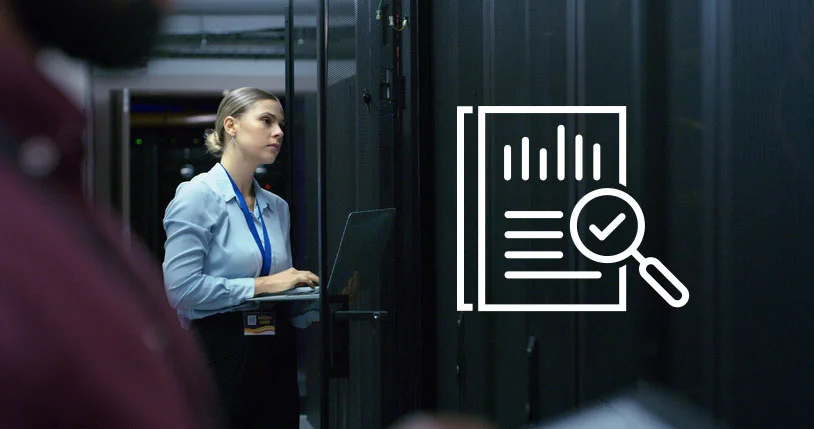SFTP to aid GDPR compliance: What you need to know
24th June 2025
Securing personal data is now a paramount consideration for businesses. Under the General Data Protection Regulation (GDPR) and the UK’s Data Protection Act 2008, businesses have a legal obligation to keep sensitive information safe – and can face heavy fines, as well as reputational damage, if they don’t.
File transfer is an everyday part of business operations, but it’s also a point of vulnerability. This is why secure file transfer methods, such as Secure File Transfer Protocol (SFTP), have been widely adopted. For organisations processing personal data, understanding how SFTP supports GDPR compliance is crucial.
In this blog, we’ll explore how SFTP fits within GDPR requirements and discuss why it’s more important than ever to fully understand the link between secure file transfer and data protection.

What GDPR means for file transfers
Introduced in 2018, GDPR sets out clear responsibilities for organisations that collect, store or process personal data in the UK and EU. GDPR’s Article 32 requires data processors and controllers to implement “appropriate technical and organisational measures” to secure personal data.
Such measures include encryption, access control and secure data handling procedures. These measures are vitally important during data transfers, when information may be at its most vulnerable to interception or tampering by malign actors.
In practical terms, this means that using unencrypted email or outdated transfer methods to send files containing personal data could put your organisation at risk – both in terms of damage to its reputation (which can be difficult to shake off) and potential financial penalties.
How SFTP supports GDPR compliance
SFTP is built with security in mind. Unlike older, less secure methods of file transfer – such as FTP without any encryption added – SFTP encrypts both commands and data. This ensures files can’t be read or altered in transit, even if intercepted.
Here are some of the key ways in which SFTP supports GDPR compliance:
Encryption in transit: SFTP uses robust encryption to secure data while it’s being transferred, directly adhering to GDPR’s requirement for protection against unauthorised or unlawful processing.
Authentication and access control: SFTP requires strong user authentication and can be configured with permissions to ensure that only authorised personnel can access files.
Audit trails and logging: Some SFTP solutions offer logging and reporting features that record when files were transferred, who accessed them and where they were sent – useful for demonstrating compliance, aiding data-flow monitoring and investigating potential incidents.
No reliance on third-party platforms: SFTP reduces dependency on email or consumer-grade file sharing tools, which may not offer the same level of control or compliance assurances.
Importantly, however, SFTP is not a silver bullet. Like any tool, its effectiveness depends on how it’s implemented. Organisations must still manage access, monitor activity and ensure that the correct training and policies are in place to support GDPR-compliant use.
Choosing the right SFTP setup
Implementing SFTP on your own systems requires more than just configuring a server. You’ll also need to consider the following:
Who has access to the system and how those permissions are controlled.
How file transfers are monitored, audited and reported.
How long files are stored and whether that retention aligns with data minimisation principles.
What happens in the event of a breach and whether incident response procedures are in place.
GDPR isn’t prescriptive about specific technologies but places the emphasis on outcomes. Are the systems you’re using capable of protecting personal data effectively? Are you regularly reviewing and updating your security measures? These are just a couple of the questions you should bear in mind.
Such questions matter whether you’re handling data internally or sharing it with external organisations. Also, if you’re using a third-party file transfer provider, that introduces additional GDPR responsibilities.
Third-party Secure FTP Hosting (SFTP) providers and GDPR
If you’re using an external provider to handle file transfers, that provider becomes a data processor – or, more specifically, a sub-processor if they’re acting on behalf of another processor. Under GDPR, data controllers must ensure any processors they work with can guarantee compliance.
This includes having appropriate security certifications, policies and practices in place to safeguard personal data.
Using a provider that meets these standards can reduce your internal compliance burden. It ensures the technical requirements required by GDPR are in place without the need for additional investment in infrastructure or ongoing maintenance.
Choosing a compliant SFTP Hosting provider
Choosing the right SFTP provider is about more than just software – it’s about trust above all. When you outsource file transfers, you’re handing over responsibility for a crucial aspect of your data protection strategy, so you need a provider that can prove a commitment to compliance.
Ridgeon Network operates as a GDPR-compliant sub-processor, supporting clients with secure, encrypted SFTP solutions. We’re ISO 27001-certified, reflecting our comprehensive approach to information security, and we also have Cyber Essentials certification.
By working with a provider with robust policies, a proven track record and independent accreditations, you can greatly reduce the internal effort involved to ensure GDPR-compliant file transfer – while having full confidence that your transfers are secure and compliant.
Conclusion
Secure file transfer isn’t just a technical issue; it’s a compliance issue as well. In the age of GDPR, businesses need tools and practices that are compliant with its principles. SFTP offers a reliable and secure method of transferring sensitive information while keeping data protected.
Used correctly, and supported by a compliant provider, SFTP (Secure FTP) can form a core part of your GDPR compliance strategy, giving you, your clients and other stakeholders the confidence that data is being handled with care at every step.
Want to know more about how SFTP hosting can help your organisation remain compliant with GDPR? Contact the Ridgeon Network team today and find out how we can support you with fully-managed Secure FTP hosting solutions.
Free Guide Downloads

We provide an all-in-one Secure FTP Hosting solution!
Need expert support with Secure FTP hosting? Ridgeon Network specialises secure SFTP/FTPS hosting solutions tailored to your specific requirements. Get in touch with our team today to find out more about how we can take the hassle out of Secure SFTP hosting.
Get in touch today with your requirements and we will be happy to assist you.